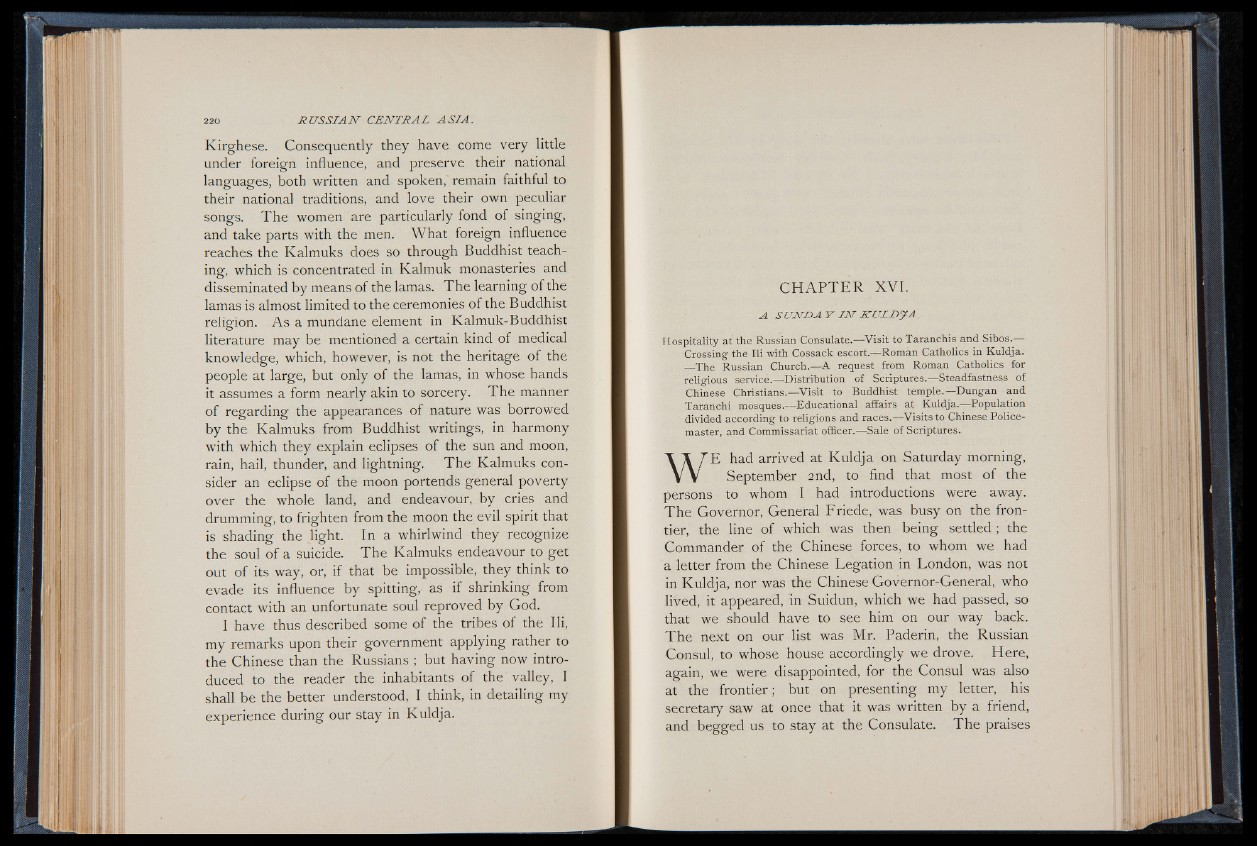
Kirghese. Consequently they have come very little
under foreign influence, and preserve their national
languages, both written and spoken,' remain faithful to
their national traditions, and love their own peculiar
songs. The women are particularly fond of singing,
and take parts with the men. What foreign influence
reaches the Kalmuks does so through Buddhist teaching,
which is concentrated in Kalmuk monasteries and
disseminated by means of the lamas. The learning of the
lamas is almost limited to the ceremonies of the Buddhist
religion. As a mundane element in Kalmuk-Buddhist
literature may be mentioned a certain kind of medical
knowledge, which, however, is not the heritage of the
people at large, but only of the lamas, in whose hands
it assumes a form nearly akin to sorcery. The manner
of regarding the appearances of nature was borrowed
by the Kalmuks from Buddhist writings, in harmony
wflth which they explain eclipses of the sun and moon,
rain, hail, thunder, and lightning. The Kalmuks consider
an eclipse of the moon portends general poverty
over the whole land, and endeavour, by cries and
drumming, to frighten from the moon the evil spirit that
is shading the light. In a whirlwind they recognize
the soul of a suicide. The Kalmuks endeavour to get
out of its way, or, if that be impossible, they think to
evade its influence by spitting, as if shrinking from
contact with an unfortunate soul reproved by God.
I have thus described some of the tribes of the Ili,
my remarks upon their government applying rather to
the Chinese than the Russians ; but having now introduced
to the reader the inhabitants of the valley, I
shall be the better understood, I think, in detailing my
experience during our stay in Kuldja.
C H A P T E R XVI.
A SU N D A Y IN KU LD JA .
Hospitality at the Russian Consulate.— Visit to Taranchis and Sibos.—
Crossing the Ili with Cossack escort.— Roman Catholics in Kuldja.
ij^ A x h e Russian Church.— A request from Roman Catholics for
religious service.— Distribution of Scriptures.— Steadfastness of
Chinese Christians.— V is it to Buddhist temple.— Dungan and
Taranchi mosques.— Educational affairs at Kuldja.— Population
divided according to religions and races.— Visits to Chinese Police-
master, and Commissariat officer.— Sale of Scriptures.
T "I J'E had arrived at Kuldja on Saturday morning, VV September 2nd, to find that most of the
persons to whom I had introductions were away.
The Governor, General Friede, was busy on the frontier,
the line of which was then being settled; the
Commander of the Chinese forces, to whom we had
a letter from the Chinese Legation in London, was not
in Kuldja, nor was the Chinese Governor-General, who
lived, it appeared, in Suidun, which we had passed, so
that we should have to see him on our way back.
The next on our list was Mr. Paderin, the Russian
Consul, to whose house accordingly we drove. Here,
again, we were disappointed, for the Consul was also
at the frontier; but on presenting my letter, his
secretary saw at once that it was written by a friend,
and begged us to stay at the Consulate. The praises